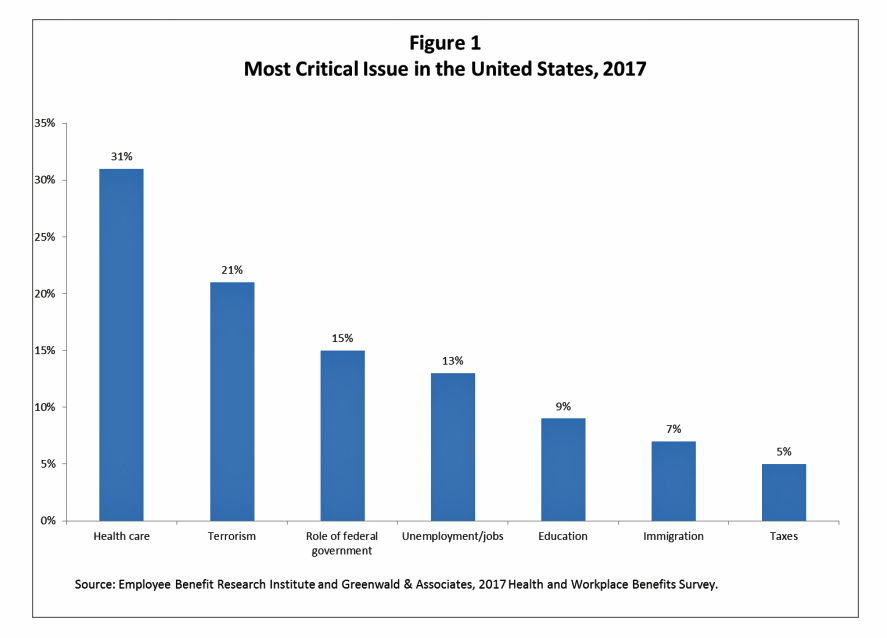 Healthcare — availability and affordability — is a more intense worry for Americans in March 2018 than crime and violence, Federal spending, guns, drug use, and hunger and homelessness.
Healthcare — availability and affordability — is a more intense worry for Americans in March 2018 than crime and violence, Federal spending, guns, drug use, and hunger and homelessness.
The Gallup Poll, fielded in the first week of March 2018, found that peoples’ overall economic and employment concerns are on the decline since 2010, at the height of the Great Recession which began in 2008. While 70% of Americans were worried about economic matters in 2010, only 34% of people in the U.S. were worried about the economy, and 23% about unemployment, in March 2018.
Gallup has asked this “worry” question for many years, and notes that this year is the fifth-year-in-a-row that healthcare ranks first or second among the issues with which Americans are most concerned. “It is the only issue of the 11 Gallup has measured consistently to maintain this level of worry,” Gallup notes.
More Democrats worry about healthcare than Republicans, this year at a huge gap of 72% for Dems vs. 39% for Republicans. It’s important to note that equal numbers of Democrats and Republicans were worried about healthcare between 2014 and 2016 as the Affordable Care Act was being implemented.
Gallup interviewed 1,041 U.S. adults 18 and over between 1st-8th March 2018.
Health Populi’s Hot Points: Today is National Employee Benefits Day, and health benefits continue to rank as the most-valued benefit offered at the American workplace.
U.S. workers also said health care was the most critical issue in America in the EBRI/Greenwald& Associates Health and Workplace Benefits Survey published in January 2018.
 I covered EBRI’s poll here in Health Populi earlier this year, explaining that, “Workers dissatisfaction with U.S. healthcare is based largely on cost: one-half of workers experienced an increase in health care costs in the past year. Furthermore, only 22% are satisfied with the cost of their health insurance plan, 18% are satisfied with the costs of healthcare services not covered by that insurance. Today, fewer than 1 in 2 people are confident in their ability to get needed treatments; this falls to one-third of people in the next decade, and only 1 in 4 people once eligible for Medicare.”
I covered EBRI’s poll here in Health Populi earlier this year, explaining that, “Workers dissatisfaction with U.S. healthcare is based largely on cost: one-half of workers experienced an increase in health care costs in the past year. Furthermore, only 22% are satisfied with the cost of their health insurance plan, 18% are satisfied with the costs of healthcare services not covered by that insurance. Today, fewer than 1 in 2 people are confident in their ability to get needed treatments; this falls to one-third of people in the next decade, and only 1 in 4 people once eligible for Medicare.”
So while “the economy” ranks much lower on the list of Americans’ worries right now, there are still 70% of people who are indeed worried about the nation’s economics, and 56% concerned about unemployment. Healthcare costs are bundled into household economics. And keeping a job usually means holding on to health insurance when the employee has been receiving it at work. Given the frailty of the ACA health insurance marketplaces (which was not addressed in the recent Congressional budget deal, much to Sen. Susan Collins’ [R-Maine} chagrin) and lack of certainty about the law’s future guarantee to insurance access, we can expect that Americans will continue to be concerned about healthcare availability and affordability.
Looking at Gallup’s table of worry issues in America, it’s important to call out some of the key social determinants of health being top-of-mind for most Americans: crime and violence at #2, guns at #4, drug use at #5, hunger and homeless at #6, environmental quality at #8, and race relations at #11. These factors directly tie to personal and public health outcomes, and can be addressed through public policies both within the healthcare policy framework and baked into other public policies outside of healthcare.





 Thank you FeedSpot for
Thank you FeedSpot for